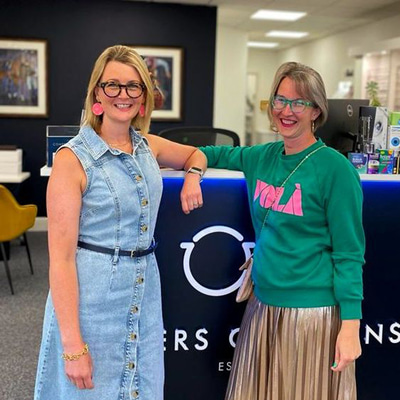- OT
- Life in practice
- Practitioner stories
- “I knew what I was expecting to see, and this wasn’t it”
An optometrist saved my life
“I knew what I was expecting to see, and this wasn’t it”
IP optometrist and practice director, Ghislaine Dunn, and her sister Elohdi, discuss an eye check during a family visit that revealed signs of a superior retinal detachment
5 min read

30 September 2023
What led you to have an eye test? Before you went for a sight test, had you experienced any symptoms and how had this affected you in day-to-day life?
Elohdi, patient and sister of optometrist, Ghislaine Dunn (E): I always take the opportunity to have Ghisli test my eyes. We nearly didn’t test my sight that particular day as I’d asked her to test my children first, and then at the last minute she insisted on doing a check-up on me too. I had absolutely no symptoms and had no expectation that she would find anything out of the ordinary.What did the optometrist find, and how did they explain the next steps to you?
E: Ghisli took a long time to examine me as she was concerned about a shadow. She had other patients to see during the afternoon but made time for a follow-up in the evening to review and confirm her concerns. She explained her concerns but could not be sure as the detachment was difficult to identify. I was referred, but the telephonic advice I received was unhelpful. Luckily Ghisli insisted that I went to the emergency eye clinic as soon as I got home to France a couple of days later where they diagnosed a retinal detachment and operated in 24 hours.Can you describe how you felt during the referral?
E: Ghisli gave as much information as she could with regards to the treatment and outcome and guided my questions for my consultant in France.Did you have to undergo further treatment and what has the outcome been?
E: I have needed no further treatment and have had good access to follow-up appointments with my consultant.Have your views on the importance of sight tests and eye care changed as a result of this experience?
E: I would encourage everyone to have a regular check-up with your optometrist, even if you have no sight-change, or symptoms. Without the check-up that day, I was at risk of losing my sight in one eye completely which would have had a huge effect.How has the experience changed your life or affected you?
E: I am thankful for the access I have to good eye care, and the fact that I can still see, but apart from that, there have been no real after-effects.It was an unusual situation to be giving worrying or bad news to a family member

Ghislaine and Elohdi
What did you identify during the sight test and what was your reaction?
Ghislaine Dunn, principal IP optometrist and director of Peters Opticians, a Hakim Group independent practice (GD): She was completely asymptomatic, so it was a bit of a shock to see lots of debris in the vitreous. It looked more like asteroid hyalosis than a positive Shafer's sign. As Elohdi is my sister, I have been testing her eyes on and off since qualifying in 2005 so I knew what I was expecting to see, and this wasn’t it. There was what I suspected to be an inferior detachment. I had squeezed her into an already full clinic with the famous last words: “let’s speed test your eyes” so I brought her back in the evening to dilate.How did you approach explaining what you had identified/suspected?
GD: Elohdi immediately sensed that I was worried about something as my jovial demeanour changed as soon as I looked in her eye. I think that I am a better actor when my patient doesn’t know me as well as she does! I explained everything as I was seeing it and told her what I suspected. It was an unusual situation to be giving worrying or bad news to a family member.What were the next steps that you took, and what was the significance of these steps to this case?
GD: It was an unusual situation as although Elohdi is British she hasn’t lived in the country for 20 years so isn’t entitled to NHS care. She was happy that she would have to pay for any care she received so I contacted the hospital but she received some poor advice. If I hadn’t been so insistent that she saw her ophthalmologist in France, she may have never followed up with it on her return.When did you hear about the results of your referral and how have you been involved since?
GD: As she is my sister we were in daily contact as she underwent scleral buckle surgery. I struggled with a sense of guilt that I had caused her to have to undergo something that created so much discomfort and stress.She has been a rigid gas permeable (RGP) contact lens wearer since she was 15 so really missed being able to wear her lenses. I saw her a few months after surgery and got her some fabulous bright pink glasses before her eyes eventually settled enough to refit her RGP lenses. Unfortunately, she has never managed to find a French optometrist who will fit RGP lenses so a few flights later she is now back in her RGP’s with comfortable fit and vision.
What would be your top tips to other practitioners when making a referral?
GD: Follow up with your patient. If my sister had taken the hospital’s advice, then she could have lost the sight in one eye.
Advertisement


Comments (0)
You must be logged in to join the discussion. Log in